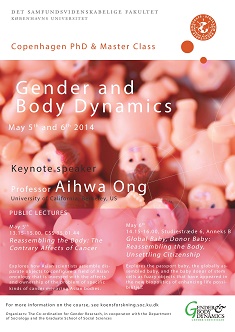Copenhagen Master Class in Gender and Body Dynamics
Professor Aihwa Ong
May 5th-7th, 2014
Faculty of Social Sciences, University of Copenhagen
The first Copenhagen Master Class in Gender and Body Dynamics will take place in May 2014 with professor Aihwa Ong, UC Berkeley, US, as the keynote speaker and main discussant. The course is composed of two lectures and two dialogue sessions over three days. The lectures are open to the public, and you can read more about the topics below.
The focus of the dialogue sessions will be issues raised in Aihwa Ong’s lectures, and will include elaborations of important concepts in her work, such as Global Assemblages, Flexible Citizenship, Neoliberalism and Socialism from afar etc. Participation in the dialogue sessions will be limited to a selected group of senior researchers, PhD fellows and MA students (max 20 participants), who will be requested to provide 1-2 relevant questions for the dialogue, which may be of general interest to Ong’s work and/or relate to their own research projects.
PhD fellows and MA students will receive 2 ½ ECTS-credits for participation with questions and 1 ½ ECTS-credits for participation without questions.
To apply, enter your details in the form below. You are requested to write a short statement of motivation where you express your interest in, and motivation for participating in the dialogue sessions. The application should not exceed 20 lines. Please attach the application document and a separate document with a brief CV.
The deadline for applying is April 30th.
Organizers: The Co-ordination for Gender Research, in cooperation with the Department of Sociology and the Graduate School of Social Sciences
Public lectures
May 5th
13.15-15.00, CSS 35.01.44
Public lecture
Reassembling the Body: The Contrary Affects of Cancer
In this lecture professor Ong explores how Asian scientists assemble disparate objects to configure a field of Asian oncology that is invested with the affects and ownership of the problem of specific kinds of cancer menacing Asian bodies. The genomic suturing of dread and optimism is a kind of attempt to recuperate vulnerabilities, which already registers the possibility of death, rather than erases it. Such affects fuel a kind of bio-geographic exceptionalism. In this experiment, new configurations such as Chinese genetic maps and female Asian biomarkers are powerful vehicles for transmitting affects of knowledge about "our bodies, ourselves."
May 6th
14.15-16.00, Studiestræde 6, Anneks B
Public lecture
Global Baby, Donor Baby: Reassembling the Body, Unsettling Citizenship
The passport baby, the globally-assembled baby, and the baby donor of stem cells, are fuzzy objects that have appeared in the new biopolitics of enhancing life possibilities. In the confluence of flexible citizenship and biomedical technologies, babies have become novel subject-objects that cross borders dividing nations as well as lines between nature and culture, blood and kinship. Parents are using babies to realize a series of life choices: to expand their citizenship options, to extend family lines, and to sustain bloodlines in the case of catastrophic illnesses. New modalities of the body, citizenship, and the family are created out of these hybrid babies.
Program
May 5th
13.15-15.00, CSS 35.01.44
Public lecture
Reassembling the Body: The Contrary Affects of Cancer
15.30-17.00, CSS cafeteria in building 35
Inaugural reception for the Gender Certificate initiative
May 6th
9.15-12.00, CSS 35.3.12
Dialogue session I
This session will focus on key ideas in professor Ong’s work.
14.15-16.00, Studiestræde 6, Anneks B
Public lecture
Global Baby, Donor Baby: Reassembling the Body, Unsettling Citizenship
May 7th
9.15-12.00, CSS 35.0.12
Dialogue session II
The session will focus on the work of participating PhD fellows and MA students.

